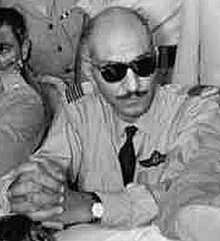Gamal Salem
Gamal Salem (1918–1968; Egyptian Arabic: جمال سالم) was a prominent member of the Egyptian Free Officers who led the Egyptian Revolution of 1952 that toppled the monarchy of Egypt and Sudan. Prior to the Revolution, he served as an officer in Royal Egyptian Air Force.[1]
Gamal Salem | |
|---|---|
 Gamal Salem following the revolution, 1952 | |
| Personal details | |
| Born | 1918 |
| Died | 1968 |
| Nationality | Egyptian |
| Occupation | Minister of Communications (1952-54) Deputy Prime Minister (1954-59) |
| Military service | |
| Rank | Wing Commander |
Career
In late 1951, Gamal Salem and Anwar Sadat joined the underground Free Officers movement established by Gamal Abdel Nasser. The group's purpose was to overthrow the monarchy of King Farouk, and end the British occupation of Egypt and Sudan.[2] Following the successful overthrow of Farouk in a coup d'état on 23 July 1952, there was disagreement on what was to be done with the deposed monarch. Although Nasser and most of the Free Officers argued that Farouk be ceremoniously exiled from Egypt and Sudan (to Italy, the King's chosen destination), Salem favoured the summary executed of the former King, stating: "A head like Farouk's only interests me when it has fallen,"[3] and continually insisted this be carried out. Ultimately, the revolutionaries settled on a peaceful exile for Farouk, and Salem was forbidden by Nasser from attending the former King's departure ceremony.[4]
Following Farouk's exile, a revolutionary government was formed by the Free Officers, headed by Muhammad Naguib. Eleven months later, the monarchy was abolished, and a republic was declared, with Naguib as President and Prime Minister. Salem gained the post of Communications Minister.[5] Salem was considered a Nasser loyalist and strongly opposed Naguib holding power, many times humiliating the latter and using the Egyptian media against him.[6]
Salem headed the 1952 agrarian reform policy, which limited landownership to only 300 feddans, with compensations for those whose land was expropriated.[7] In February 1954, Salem headed a military court which arrested and tried Armoured Corps officers loyal to Naguib.[8] In late October 1954, following an assassination attempt on Nasser by a member of the Muslim Brotherhood, Salem was chosen to serve as the chief judge of the military court which sentenced eight Brotherhood leaders to death. However, two sentences were later commuted.[9] Following Nasser's confirmation as President in 1956, Salem later served as Deputy Prime Minister.[10]
Salem's health started deteriorating, and his political career faded in 1959 due to his frequent foreign travel for treatment. He died in 1968.[1]
References
- "All the revolution's men". Al Ahram. 24 July 2002. Archived from the original on 30 April 2012. Retrieved 2009-07-24.
- Gordon 1992, p. 47
- Flower 1976, p. 183
- Aburish 2004, pp. 42–43
- Gordon 1992, p. 87
- Vatikiotis 1978, p. 139
- Alexander 2005, p. 54
- Vatikiotis 1978, p. 141
- Gordon 1992, p. 182
- Gordon 1992, p. 189
Bibliography
- Aburish, Said K. (2004), Nasser, the Last Arab, New York City: St. Martin's Press, ISBN 978-0-312-28683-5
- Flower, Raymond (1976), Napoleon to Nasser: the story of modern Egypt, Taylor & Francis, ISBN 0-905562-00-3
- Gordon, Joel (1992), Nasser's Blessed Movement: Egypt's Free Officers and the July revolution, Oxford University Press US, ISBN 0-19-506935-8
- Vatikiotis, Panayiotis J. (1978), Nasser and his Generation, Taylor & Francis, ISBN 0-85664-433-1
- Alexander, Anne (2005), Nasser, Haus Publishing, ISBN 978-1-904341-83-3